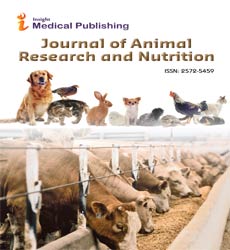Climate Change Can Reduce the Availability of Livestock Products
Aisha Jensen*
Department of Animal Breeding and 'Genetics, Federal University of Agriculture, Abeokuta, Nigeria
DOI10.36648/2572-5459.9.1.115
Aisha Jensen*
Department of Animal Breeding and Genetics, Federal University of Agriculture, Abeokuta, Nigeria
- *Corresponding Author:
- Aisha Jensen
Department of Animal Breeding and Genetics, Federal University of Agriculture, Abeokuta,
Nigeria,
E-mail: Jensen_a@gmail.com
Received date: January 08, 2024, Manuscript No. IPJARN-24-18911; Editor assigned date: January 11, 2024, PreQC No. IPJARN-24-18911 (PQ); Reviewed date: January 24, 2024, QC No. IPJARN-24-18911; Revised date: January 31, 2024, Manuscript No. IPJARN-24-18911 (R); Published date: February 08, 2024, DOI: 10.36648/2572-5459.9.1.115
Citation: Jensen A (2024) Climate Change Can Reduce the Availability of Livestock Products. J Anim Res Nutr Vol.9 No.1: 115.
Description
National Food-Based Dietary Guidelines (FBDGs) are typically crafted with a primary focus on human health, often overlooking sustainability considerations. Circular food production systems present a promising avenue toward achieving sustainable, healthy diets. These systems prioritize closing nutrient cycles where feasible and minimizing reliance on external inputs, thus mitigating environmental impacts. One approach to effecting this change is by restricting livestock feed to locally available Low-Opportunity-Cost Biomass (LOCB).
In this investigation, by-products of the food industry namely, oils extracted from melon and pumpkin seeds were utilized in the preparation of lamb meat burgers. The substitution of each emulsified seed oil for animal fat was tested across three concentrations. The resulting burgers displayed a decreased percentage of polyunsaturated fatty acids and an elevated concentration of vitamin E, with variations observed depending on the oil emulsion used.
To assess the acceptability of these reformulated burgers, a discrete choice experiment was conducted to gauge the impact of labeling them as "with seed oil." Surprisingly, the findings indicate that such labeling does not enhance product acceptance; in fact, it may even result in a negative willingness to pay. Consequently, it is suggested that strategies emphasizing the burgers' reduced fat content or their higher polyunsaturated fatty acid content be prioritized.
Animal diets
The nutritional adequacy of both animal-based and plantbased Low Protein Diets (LPDs) and moderate protein diets, recommended for patients with chronic kidney disease, remains inadequately explored. Therefore, an analysis was conducted on the nutrient content of three representative LPDs and moderate protein diets (lacto-ovo vegetarian, omnivorous, and vegan) commonly prescribed for non-dialyzed chronic kidney disease or chronic dialysis patients in the United States, across various protein intake levels.
Some individuals adopt vegetarian or plant-based diets in pursuit of improved health. Observational evidence suggests that diets comprising higher proportions of Animal-Source Foods (ASFs) are associated with elevated disease risk and premature mortality. Interestingly, studies indicate that individuals consuming fewer animal-source foods often exhibit fewer disease risk factors and unhealthy behaviors, hinting at potential bias within these investigations.
As the global population burgeons, the demand for edible animal products, particularly meat, escalates unabatedly, putting pressure on the food animal industry. To meet this ever-growing need, the animal sector must expand its productivity. While antibiotics have historically enhanced growth performance in food animal production, their overuse has led to a surge in antimicrobial resistance, prompting stringent restrictions on their usage. Consequently, this setback affects both animals and farmers, catalyzing the pursuit of sustainable antibiotic alternatives in animal production.
The production of human food profoundly impacts the environment across various dimensions. It alters global biomass and nutrient cycles, contributes to climate change and exacerbates biodiversity loss. Imbalanced diets, characterized by low fruit and vegetable intake and high consumption of red and processed meat, pose significant risks for non-communicable diseases like cardiovascular diseases, stroke, cancer and diabetes. In high-income countries, transitioning towards plantbased diets is often advocated to mitigate the environmental footprint of food consumption and enhance human health. This shift is supported by evidence favoring plant-based foods over animal products in terms of environmental impact and the reduced risk of diet-related diseases.
Food-based dietary guidelines
Food-Based Dietary Guidelines (FBDGs) play a pivotal role in guiding healthier food choices. While environmental concerns are increasingly integrated into FBDGs, many national guidelines primarily prioritize health and nutritional criteria, often overlooking sustainability aspects. Unlike globally applicable guidelines such as the eat-lancet commission, national FBDGs consider geographical and cultural factors, with significant integration into education and nutrition counseling at the national level.
While the need to reduce the consumption and production of animal products is widely acknowledged, diverse perspectives exist on how to achieve sustainable animal production and which products should be prioritized. From a supply perspective, intensifying animal production systems is proposed to lower environmental impacts per unit of output, albeit requiring higher concentrate feed inputs. Conversely, demand-side solutions advocate for substantial reduction or minimization of animal product consumption. However, these narratives often overlook land suitability and resource competition between feed and food production.
In circular food systems, resources prioritize human food over animal feed, aiming to close nutrient cycles and minimize external inputs. This approach emphasizes feeding animals with domestically available biomass, known as ecological leftovers, thereby reducing feed-food competition and enhancing biomass utilization. By recycling biomass and nutrients back into the food system, animals play a vital role in resource efficiency. The environmental role of animal products remains largely unexplored. Integrating sustainability considerations into FBDGs could illuminate the environmental implications of dietary choices and promote efficient resource use in food production.

Open Access Journals
- Aquaculture & Veterinary Science
- Chemistry & Chemical Sciences
- Clinical Sciences
- Engineering
- General Science
- Genetics & Molecular Biology
- Health Care & Nursing
- Immunology & Microbiology
- Materials Science
- Mathematics & Physics
- Medical Sciences
- Neurology & Psychiatry
- Oncology & Cancer Science
- Pharmaceutical Sciences
